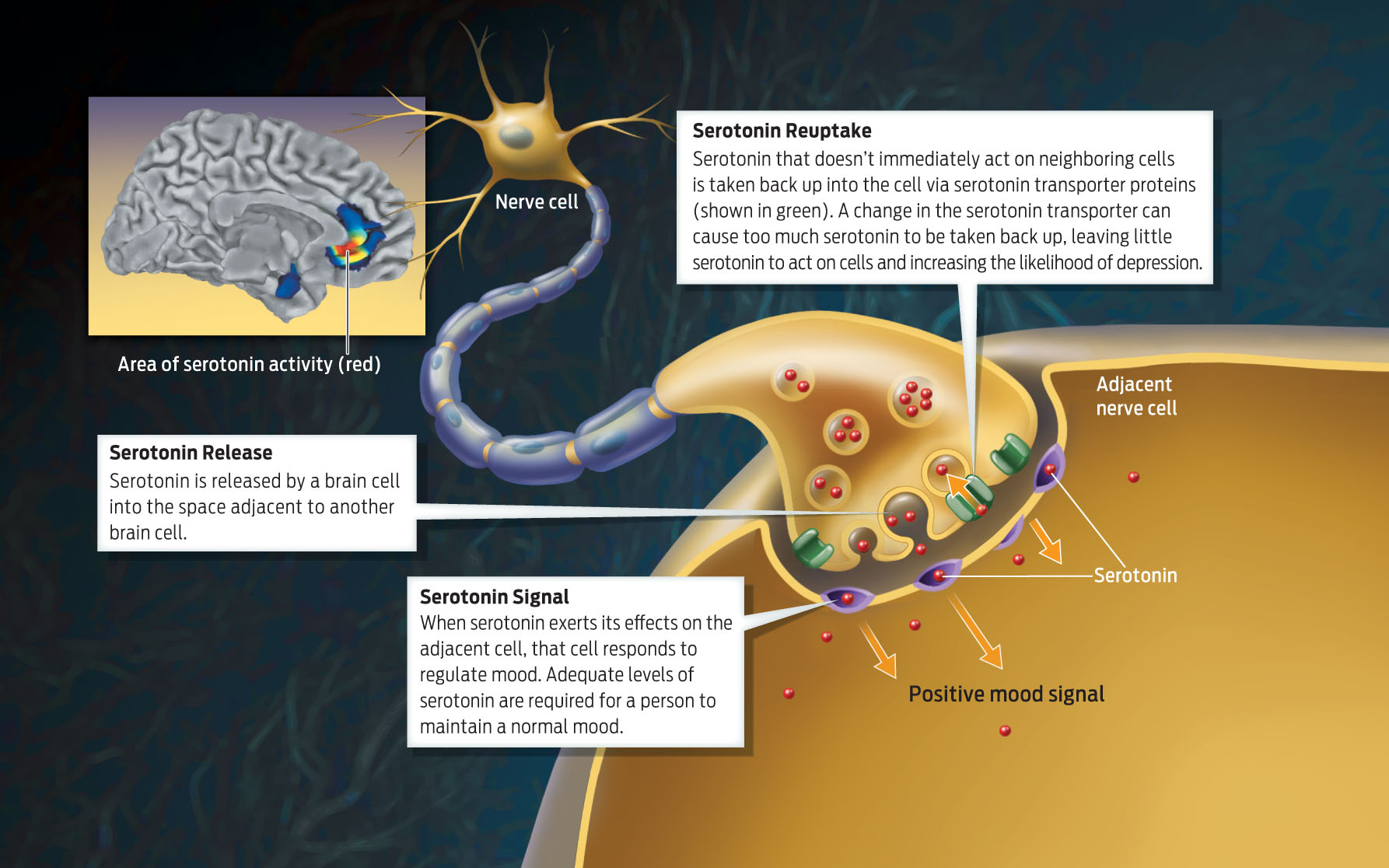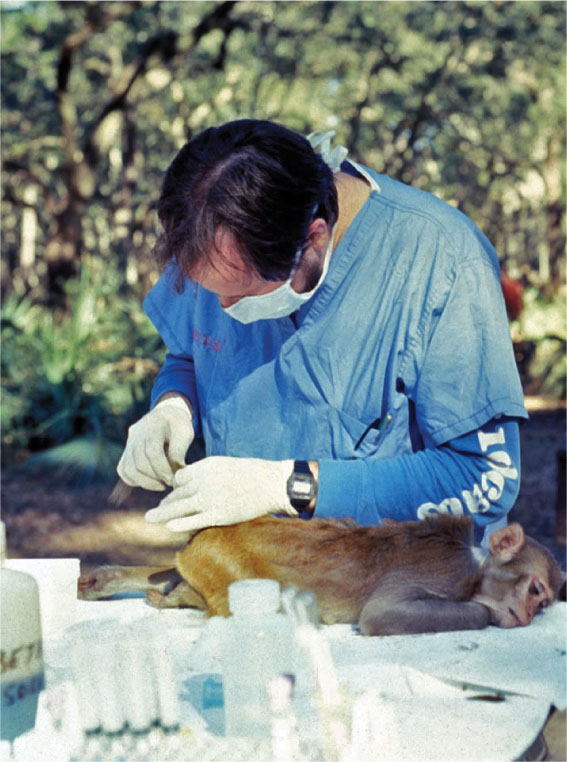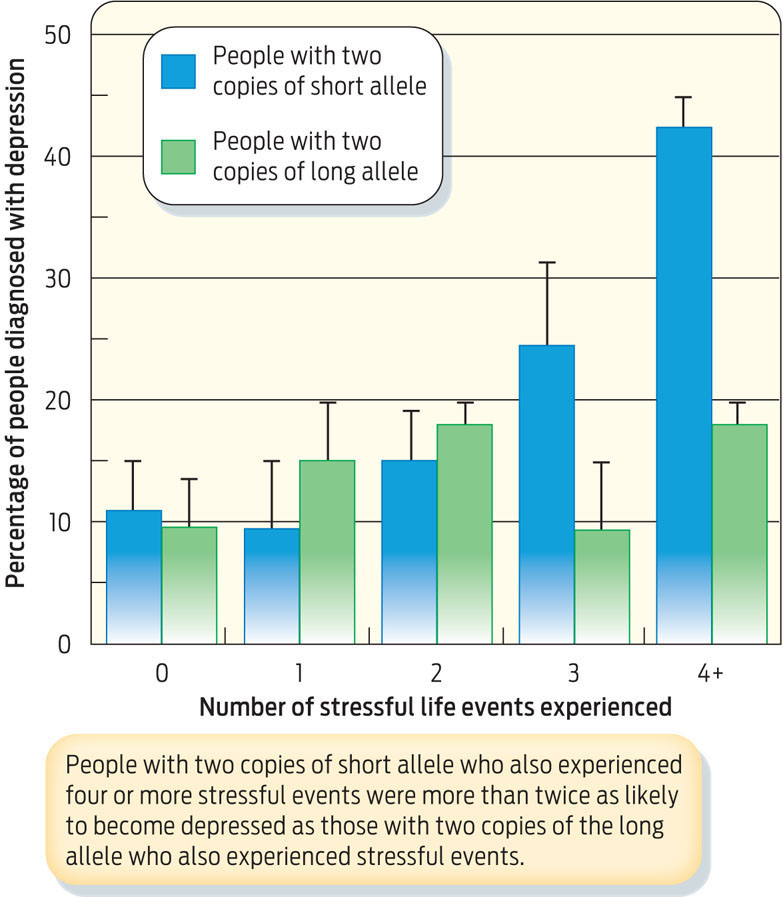Multifactorial Inheritance
 Are some people genetically predisposed to depression?
Are some people genetically predisposed to depression?
ANSWER: In the early 1990s, Stephen Suomi and Dee Higley, researchers at the National Institute of Child Health and Human Development, were studying how stress affects the mental development of infant monkeys. They were investigating whether certain alleles of a gene that encodes the serotonin transporter protein made infant monkeys more vulnerable to stress early in life.
Other researchers had shown that the serotonin transporter gene influences the levels of serotonin present in the spaces between brain cells, and that low levels of serotonin in these spaces is one biological hallmark of anxiety and depression in people (INFOGRAPHIC 12.10) .
Serotonin is an important signaling molecule in the brain. The serotonin transporter influences the levels of serotonin available for signaling. People with depression have lowered levels of serotonin in the spaces between cells.

273
The serotonin transporter gene is located on chromosome 17. There are two common alleles: a short version and a long version. The long version contains about 44 extra base pairs. Previous research had suggested that people who had at least one copy of the short version of this gene were much more likely to have an anxiety disorder.

Higley and Suomi showed that infant monkeys exposed to stress, such as being deprived of their mothers, and who carried short versions of this allele, behaved differently from their counterparts: they were more anxious, aggressive, and some even became alcoholics as adults.
274
Despite this finding in monkeys, it quickly became clear that having short versus long alleles alone could not explain why some people become severely depressed while others are more resilient. Researchers could not find a clear association between any particular allele and depression in people.
Rather than continue to hunt for depression-related alleles, other researchers took a different tack. In 2003, Terrie Moffitt and Avshalom Caspi, a husband-and-wife team of psychologists at King’s College London, decided to test whether genes and environment interact to produce depression in people. Moffitt and Caspi turned to a long-term study of almost 900 New Zealanders, identified these participants’ serotonin transporter alleles, and interviewed them about traumatic experiences in early adulthood—experiences such as a major breakup, a death in the family, or serious injury—to see if these difficulties brought out an underlying genetic tendency toward depression.
The results were striking: clinical depression was diagnosed in 43% of participants who had two copies of the short allele and who had experienced four or more tumultuous events. By contrast, only 17% of participants who had two copies of the long allele and who had endured four or more stressful events had become depressed—this was no more than the rate of depression in the general population. Participants with the short allele who experienced no stressful events fared pretty well, too—they also became depressed at no more than the average rate. Clearly, it was the combination of hard knocks and short alleles that more than doubled the risk of depression (INFOGRAPHIC 12.11) .
In 2003, Terrie Moffitt and Avshalom Caspi showed that a specific allele of the serotonin transporter gene—a gene that influences levels of the signaling molecule serotonin in the brain—in combination with stressful life events can cause depression. The gene comes in long and short versions.

Caspi and Moffitt’s study was one of the first to examine the combined effects of genes and experience on a specific mental trait—psychiatrists were delighted. While scientists had been trying to tease apart environmental and genetic influences on physical diseases like cancer, this was the first study to investigate this relationship in a mental disorder. Moreover, the findings reinforced the emerging view that the majority of mental illnesses and other complex diseases cannot be explained by genetic or environmental factors alone, but often arise from an interaction between the two. In other words, mental illnesses exhibit multifactorial inheritance.
Multifactorial inheritance is a common pattern of inheritance. Diseases such as asthma, diabetes, and heart disease are all caused by a combination of several genes and their interaction with the environment. For example, some studies have found that cigarette smoke, air pollution, and ozone can exacerbate asthma. Other studies have shown that people who carry the E4 allele of a gene called APO, which codes for a protein found in the cholesterol-carrying lipoproteins in blood (see Chapter 27), have an increased chance of developing heart disease if they smoke and don’t exercise compared to people with other APO E alleles who smoke and don’t exercise. Even for traits that are largely genetically determined, the environment plays a very important role in influencing our phenotype.
275
The majority of mental illnesses and other complex diseases cannot be explained by genetic or environmental factors alone, but often arise from an interaction between the two.